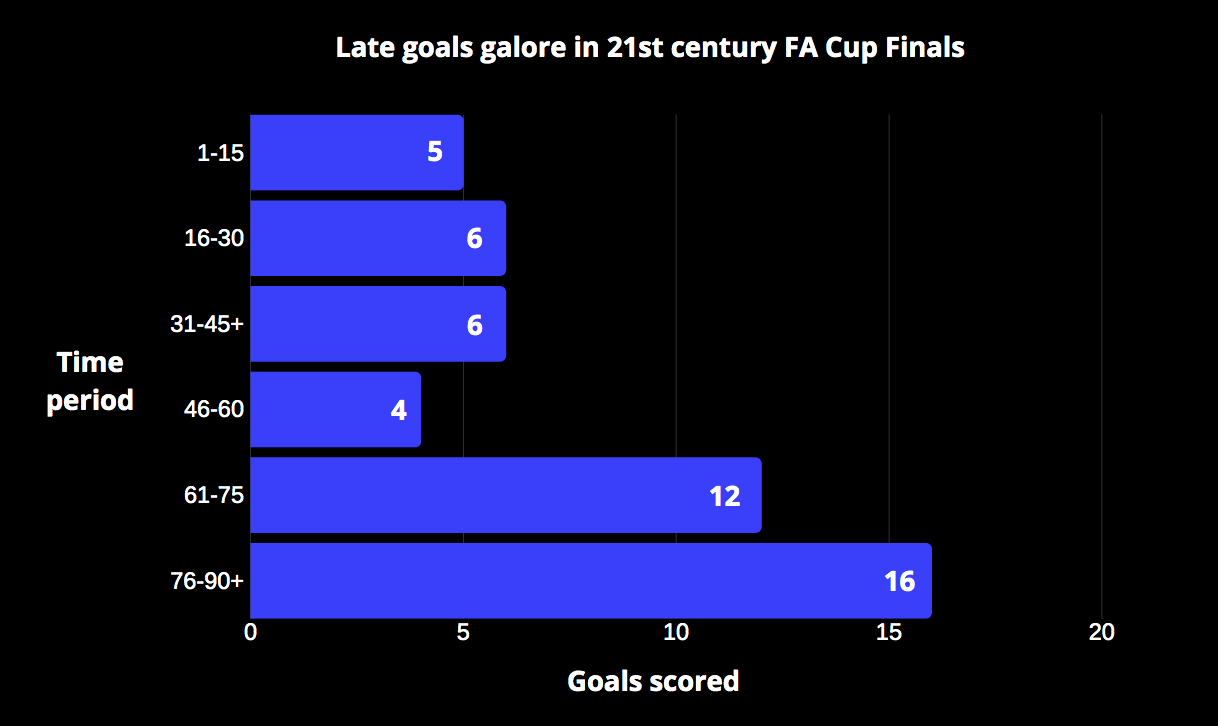
May 23, 2020
The build up on a Saturday before the start of an FA Cup final is something many past footballing greats reminisce about. Ian Wright for one always speaks glowingly about how much the FA Cup means to him, and how he felt in his first final with Crystal Palace. Walking out on to the grass at Wembley to play an FA Cup final is something to be treasured for a lifetime.
Jose Mourinho, who won the FA Cup with Chelsea in 2007, once said in an interview with Gary Linekar about how even in Portugal growing up, the proverbial “magic of the FA Cup” was real. He said: “Live on TV, we had some national team matches, not all of them. But always the FA Cup final.” Around the world, many footballers do realise how much the FA Cup means and especially when you reach the final.
One other thing Mourinho mentioned in that interview was that in the build up to the 2007 final against Manchester United, he thought that to walk up those famous stairs and pick up a loser’s medal would be devastating. To get to a final is an amazing feeling, especially if you are not one of the “Big Six” in the Premier League. But there will always be an even bigger desire to place your hands on that coveted trophy.
Today would have been FA Cup final day had the whole world not been dramatically impacted by the coronavirus pandemic. So what does it take to win an FA Cup final in the modern day? Are there any specific trends in relation to teams, times that goals are scored or the type of players that succeed on the big day? I had a look at some of the data to find out if there are any answers to these questions.
For this analysis, I looked at all FA Cup finals in the 21st century which means there is data from the last 20 FA Cup finals. Not only does this give a relatively big sample size of finals to consider, but it also covers the change to more dominance from the biggest teams in the Premier League. It is now very rare for a team even in the bottom half of the Premier League to be in the FA Cup final, let alone a team from the lower divisions in English football.
The first FA Cup final of the millennium was between Chelsea, who were not yet the powerhouses they are today, and Aston Villa. Since winning 1-0 on that day, Chelsea have made seven more FA Cup finals and won five of those matches. Arsenal made four out of five finals from 2001 to 2005, and then made a further three finals between 2014 and 2017. These two teams, alongside current champions Manchester City and United, have dominated when it comes to appearances in FA Cup finals over the last two decades.
The last time a team from outside the top flight made it into the FA Cup final was Millwall back in 2004, when they lost 3-0 to United. While there have been appearances from teams like Watford, Crystal Palace and Villa in recent years, it is becoming rarer and rarer for teams other than the “Big Six” to contest for the FA Cup at Wembley. With the financial power of the big teams and relentless ambition to win all the trophies they can, it looks like that stranglehold could continue for a while.
Another thing to look at is the score lines in finals over the past 20 years. Discounting the aberration that Watford suffered last year at the hands of City, finals have in the large part been very close, and seen just a few goals being scored. Eleven of the last 13 FA Cup finals have been decided by a one goal difference. Only last year and Arsenal’s 4-0 hammering of Villa in 2015 have been finals decided by more than one goal in that time. The two finals before 2007 were decided by penalty shootouts, so an even tighter way to separate teams. The pressure, despite what people say about the FA Cup dwindling in its popularity and importance, still seems to play a huge role. City being so much better than their opponents last year should not be taken for granted, that kind of display does not happen often.
Everyone probably dreams of scoring a long range screamer for their favourite team at Wembley to win the FA Cup. But if the last 20 years are taken into consideration, you would be better off trying to get in the box. The last 15 goals that have been scored in an FA Cup final have been from inside the box. Alexis Sanchez’s wonderful strike for Arsenal in their victory over Villa five years ago was the last goal from outside the 18-yard area. In fact, of the 49 goals scored in FA Cup finals dating back to 2000, only eight of them have been scored from outside the box.
The timings of goals in FA Cup finals over the last 20 years have also been very interesting to see. If we divide finals into 15 minute parts, and including extra time for the last quarter of the match, there are some clear trends. Twenty-eight goals have been scored after the 60th minute in FA Cup finals from 2000, including 16 after the 75th minute of the match. Didier Drogba’s goal against United in 2007 was in the 116th minute and has been the latest goal scored in this period. Conversely, there have been only five goals scored in the first 15 minutes of FA Cup finals over the last 20 years. But Louis Saha’s goal for Everton in 2009 broke the record for the fastest goal ever in the FA Cup final, as he scored after just 25 seconds.

Of course, all this data needs to be taken with a pinch of salt. The cliché of anything being possible in a football match is really true and any team can win on a particular day. But if your team really wants to win the FA Cup, your chances would be better if you got better at scoring really late goals, and winning really close matches. And if you are Arsenal or Chelsea in this century, those chances only get better.